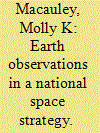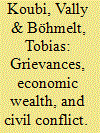| Srl | Item |
| 1 |
ID:
101229


|
|
|
|
|
| Publication |
2010.
|
| Summary/Abstract |
Natural and environmental resources, ranging from supplies of fossil fuels to agricultural productivity, have long been recognized as part of the natural wealth of nations. Earth observations from the vantage point of space provide a unique means of understanding, measuring, and monitoring these resources both domestically and globally. This article argues that design of a national space strategy includes recognition of this role of Earth observations, and accords them priority commensurate with the value of the resources they observe. Recognizing the overlap between a national space strategy and a national security strategy, the article notes examples of the complementarities between Earth observations data from civilian and national security observing systems. The limited public transparency of data from national security sources hinders their usefulness in informing many policy decisions, however. The article also considers whether international cooperation in Earth observations, as in other national space activities, is warranted or workable in a national space strategy.
|
|
|
|
|
|
|
|
|
|
|
|
|
|
|
|
| 2 |
ID:
128854


|
|
|
|
|
| Publication |
2014.
|
| Summary/Abstract |
One of the most robust findings in the literature on civil conflicts is that high income levels are associated with a lower risk of conflict onset. This article addresses the wealth-conflict link and discusses it in relation to the dominating `greed vs. grievance' dichotomy. It is further argued that the effect on conflict of grievances, in the form of horizontal inequalities, is conditioned on national wealth. More specifically, there may be a higher risk of civil war in those countries that have much wealth, but where a large share of the population is potentially excluded from accessing it. The empirical analyses testing this argument employ time-series cross-section data for 1951-2004 and find support for the theory. The authors also show that taking this conditional relationship into account improves our ability to predict the onset of civil conflict.
|
|
|
|
|
|
|
|
|
|
|
|
|
|
|
|
| 3 |
ID:
116403


|
|
|
|
|
| Publication |
2012.
|
| Summary/Abstract |
This article provides an analytical discussion on the rise of political Islam in Turkey by examining the rise of the Islamic Welfare Party in the 1990s. The study, utilizing a historic analysis, reveals that the Islamic opposition in Turkey is both a reaction to Kemalist reforms and to undesirable local conditions, especially, economic distress, unjust distribution of national wealth, corruption, and perceived lack of freedom. Certain structural conditions aiding the Welfare Party to increase its power are also discussed. Many lessons learned in terms of managing the Islamic challenge and implications with respect to the prospect are addressed at the end.
|
|
|
|
|
|
|
|
|
|
|
|
|
|
|
|